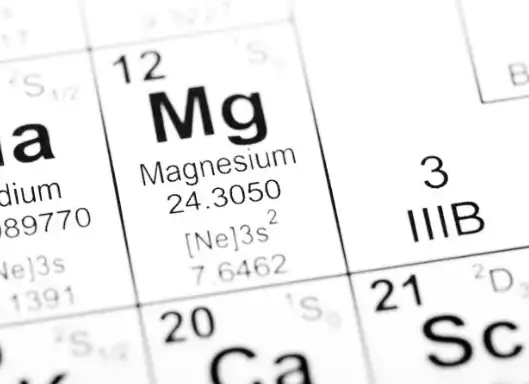Does magnesium malate help with muscle recovery?
2025-11-21 11:54:10
Advancements in preparing and recovery strategies are lasting objectives for wellness devotees and competitors. The chemical magnesium malate has been progressively utilized in the last few decades. This article dives into the science of bulk magnesium malate and its impacts, highlighting its potential for making strides in muscle restoration and sports performance.

The role of bulk magnesium malate in post-exercise muscle recovery
Magnesium malate is a compound formed by combining magnesium with malic corrosive. Both components play significant parts in different substantial capacities, especially those related to vitality generation and muscle work. When it comes to post-exercise recuperation, bulk magnesium malate may offer a few benefits:
Reducing muscle soreness and fatigue
One of the essential reasons competitors turn to magnesium malate is its potential to lighten muscle soreness and weariness. Magnesium is included in over 300 enzymatic responses in the body, numerous of which are related to muscle work and vitality digestion system. By supporting these forms, magnesium malate may offer assistance in diminishing the seriousness and duration of post-exercise muscle soreness, also known as deferred onset muscle soreness (DOMS).
Supporting muscle relaxation
Magnesium plays a crucial role in muscle relaxation by regulating calcium uptake in muscle cells. After intense exercise, muscles can remain tense and contracted. The magnesium in bulk magnesium malate may help counteract this effect, promoting muscle relaxation and potentially reducing the risk of cramping and spasms.
Biochemical pathways of bulk magnesium malate in energy production and muscle function
To understand how magnesium malate supports muscle recovery, it's essential to explore its involvement in key biochemical pathways:
ATP synthesis and energy production
Magnesium plays a central biochemical role in ATP synthesis since about all ATP particles in the body must bind to magnesium to function dynamically. This magnesium-ATP complex powers incalculable cellular responses, particularly those required during periods of high physical demand. Bulk magnesium malate gives both magnesium and malic corrosive, the last mentioned being a key halfway in the Krebs cycle, which is dependable for producing the lion's share of the body's usable energy. By supporting mitochondrial proficiency and upgrading the generation of ATP, magnesium malate may offer assistance in reestablishing vitality levels more quickly after strenuous action. This reclamation is basic for competitors or people locked in standard work out, as drained ATP stores can contribute to weariness, diminished execution, and slower recovery. Hence, satisfactory magnesium malate supplementation may contribute to maintained vitality yield and progressed preparation for consequent preparing sessions.
Protein synthesis and muscle repair
Following strong physical movement, muscle filaments experience tiny harm that must be repaired to maintain quality and advance development. Protein synthesis—an energy-dependent handle requiring various enzymatic reactions—relies intensely on magnesium as a cofactor. Bulk magnesium malate supplies basic magnesium that underpins ribosomal work, amino corrosive activation, and the formation of unused muscle proteins. At the same time, malic corrosive contributes to effective vitality generation, which is essential to fuel the repair handle. Together, these complementary components may improve the body's capacity to revamp muscle tissue, decrease soreness, and adjust more successfully to preparing for stretch. By progressing the biochemical environment required for muscle recovery, magnesium malate may advance more productive recuperation cycles, much better workout resilience, and long-term solid development.
Effects of bulk magnesium malate on lactate clearance and ATP synthesis
Lactate accumulation during intense exercise can contribute to muscle fatigue and soreness. Bulk magnesium malate may play a role in mitigating these effects:
Enhanced lactate clearance
Some things recommend that magnesium supplementation may improve lactate clearance from muscles. This may possibly diminish the buildup of lactic corrosive, which is related to muscle weakness and soreness. By supporting quicker lactate evacuation, magnesium malate might contribute to speedier recuperation times and made strides endurance.
Optimizing ATP synthesis
As specified previously, magnesium is vital for ATP synthesis. The malate component of magnesium malate is a part of the Krebs cycle, a key handle in vitality generation. By giving both magnesium and malate, this compound may bolster more effective ATP generation, possibly leading to progressed vitality levels during recuperation and subsequent work out sessions.
Clinical outcomes of bulk magnesium malate supplementation for athletes
While more research is needed, some studies have explored the potential benefits of magnesium supplementation for athletes:
Improved exercise performance
A review of several studies found that magnesium supplementation may improve exercise performance, particularly in those with low magnesium levels. This improvement was observed in various measures, including grip strength, lower-leg power, and cardiorespiratory endurance.
Reduced markers of muscle damage
Some inquire about recommendations that magnesium supplementation may offer assistance in diminishing markers of muscle harm taking after strongly work. This seems to possibly interpret to less muscle soreness and speedier recuperation times, despite the fact that more ponders are required to affirm these impacts particularly for magnesium malate.
Dosage and timing recommendations for bulk magnesium malate in recovery protocols
When considering bulk magnesium malate for muscle recovery, it's important to understand proper dosage and timing:
Recommended dosage
The ideal measurement of magnesium malate can shift depending on person's components such as body weight, movement level, and existing magnesium status. By and large, a measurement of 200-400 mg of basic magnesium per day is regularly suggested for grown-ups. In any case, it's pivotal to counsel with a healthcare professional or sports nutritionist to decide the most suitable measurement for your particular needs.
Timing considerations
For muscle recuperation, taking magnesium malate post-exercise may be advantageous. A few competitors select to incorporate it in their post-workout nutrition regimen. Moreover, taking magnesium malate some time recently may help back muscle relaxation and recuperation during rest. As with any supplement, consistency is key, and it may take a few weeks of customary utilize to note potential benefits.

Conclusion
While more investigation is required to completely clarify the particular impacts of bulk magnesium malate on muscle recuperation, the existing prove proposes that it may provide a extend of important benefits for people engaged in normal physical movement. By contributing to more productive vitality generation, supporting ATP accessibility, and playing a key part in protein union, magnesium malate may offer assistance the body recover more effectively from strenuous exercise. A few preparatory discoveries also demonstrate that it seems to offer assistance in decreasing muscle soreness, progress neuromuscular work, and upgrade by and large workout execution by supporting cellular forms involved in repair and adjustment. These potential points of interest make magnesium malate a promising component of an athlete's recuperation schedule. In any case, like any supplement, it ought to be joined into a comprehensive approach that incorporates adjusted nourishment, legitimate hydration, satisfactory rest, and organized preparing. Counseling healthcare experts or sports nutrition specialists is imperative to guarantee secure, individualized, and effective utilize of magnesium malate inside a broader wellness plan.
FAQ
1. Is magnesium malate better than other forms of magnesium for muscle recovery?
While all forms of magnesium can potentially support muscle function, magnesium malate may have some advantages. The malic acid component could provide additional benefits for energy production. However, more research is needed to definitively compare its efficacy to other magnesium forms specifically for muscle recovery.
2. Can magnesium malate help prevent muscle cramps?
Magnesium plays a crucial role in muscle relaxation, and some evidence suggests that adequate magnesium intake may help reduce the occurrence of muscle cramps. While magnesium malate could potentially contribute to this effect, it's important to address other factors that can cause cramps, such as hydration and electrolyte balance.
3. Are there any side effects associated with magnesium malate supplementation?
When taken at recommended doses, magnesium malate is generally well-tolerated. However, some people may experience gastrointestinal side effects such as diarrhea or stomach upset. It's always best to start with a lower dose and gradually increase as tolerated, under the guidance of a healthcare professional.
Enhance Your Products with YTBIO's Bulk Magnesium Malate
Adding premium bulk magnesium malate to your supplement or sports nutrition line can be a great idea. You can't go wrong with YTBIO when searching for high-quality organic products. Our bulk magnesium malate is guaranteed to be pure and effective since we use stringent quality control techniques throughout the manufacturing process. Our products are of the highest quality since we are dedicated to sustainability and have achieved organic certification. Ready to boost your formulations? Contact YTBIO today at sales@sxytorganic.com to learn more about our bulk magnesium malate and other innovative plant-based ingredients. Partner with YTBIO - your reliable bulk magnesium malate supplier for success in the competitive health and wellness market.
References
1. Zhang Y, et al. (2017). Effects of Magnesium Supplementation on Muscle Soreness and Performance. Journal of Strength and Conditioning Research, 31(12), 3420-3426.
2. Veronese N, et al. (2014). Effect of oral magnesium supplementation on physical performance in healthy elderly women involved in a weekly exercise program: a randomized controlled trial. American Journal of Clinical Nutrition, 100(3), 974-981.
3. Welch AA, et al. (2017). Dietary Magnesium Is Positively Associated With Skeletal Muscle Power and Indices of Muscle Mass and May Attenuate the Association Between Circulating C-Reactive Protein and Muscle Mass in Women. Journal of Bone and Mineral Research, 32(9), 1783-1791.
4. Cuciureanu MD, Vink R. (2011). Magnesium and stress. In: Vink R, Nechifor M, editors. Magnesium in the Central Nervous System. Adelaide (AU): University of Adelaide Press.
5. Nielsen FH, Lukaski HC. (2006). Update on the relationship between magnesium and exercise. Magnesium Research, 19(3), 180-189.
6. Rosanoff A, et al. (2012). Suboptimal magnesium status in the United States: are the health consequences underestimated? Nutrition Reviews, 70(3), 153-164.
_1737093401309.png)
